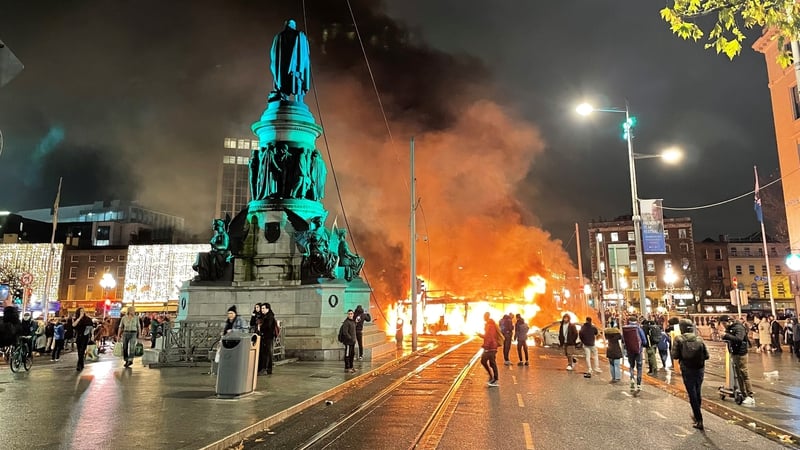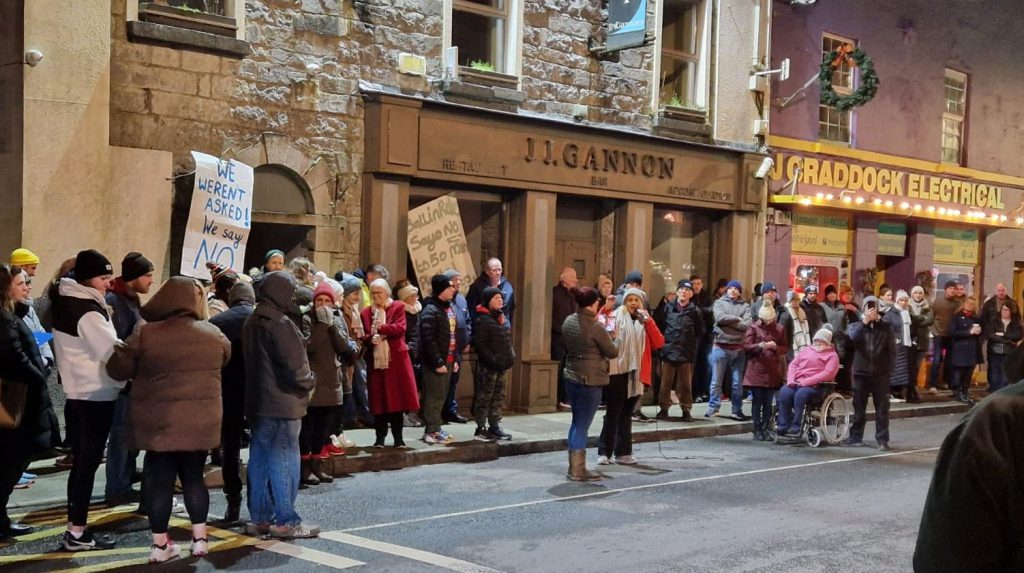Recent protests against the housing of single male asylum seekers in Ireland highlight the crucial role played by security in far-right discourse. Claire Hamilton argues that we need to think more about the ‘dangerous Others’ at the heart of populism’s appeal
Despite having no elected representatives from hard-right parties, in recent years Ireland has been experiencing a rise in far-right activity. At the end of November last year, this culminated in violence and rioting on the streets of Dublin after three children and an adult female were stabbed by a foreign-born Irish citizen (see photo below). Alongside the riots, protests have been ongoing against the accommodation of asylum seekers in Dublin and a number of rural locations. In some cases, protesters have even carried out arson attacks.
The scale and frequency of these events has called into serious question the idea that Ireland is somehow immune from the anti-immigrant far right. Indeed, there is now an expectation that several anti-immigration candidates may emerge to run in the forthcoming local elections.

The main political issue in Ireland at the moment is housing. Rising rents, homelessness, the cost-of-living crisis and the highest immigration rates since the Celtic Tiger years have in some ways combined to create a perfect storm. Yet, what is particularly interesting about the messaging promoted at many of these protests is the focus on the gender of the residents. Communities have said they would welcome and integrate families but ‘not groups of single men’ or ‘single, unvetted, military-age men’.
This is well illustrated by the recent protests in Ballinrobe, County Mayo, where the local authority planned to house 50 male international protection applicants. Protesters focused on the fact that the men were ‘unvetted’, and that the hotel is just a couple of doors down from the local crèche (see the image below). Damian Ryan, local Fianna Fáil councillor and protester, repeatedly referred to ‘the male denomination’ as the problem while repeatedly refusing to say why. A post on social media from another recent protest read:
Let's get down and show that Carlow doesn't want migrants dumped in our town only a hundred metres from an all-girls school
Following the protests in Ballinrobe, the government reneged on its plans and announced that the building in Ballinrobe would be used only for families and children. Protesters' descriptions of the men as ‘military aged’ and ‘unvetted’ are revealing, echoing messaging typical of English white supremacist groups and figures, such as the far-right Tommy Robinson. The implication, of course, is that male refugees are an inherent threat to the public, and to women and children in particular. Moreso, the reference to children, particularly girls, and the need to ensure their safety, is a strong nod in the direction of sexual crime.

National and international sources dismiss suggestions of a link between the number of asylum seekers and increased crime. Despite this, examples abound internationally of far-right politicians forging these sorts of rhetorical links. In 2016, Donald Trump famously described Mexicans as ‘rapists’ who bring ‘crime’ and ‘drugs’.

A 2016 Swiss People Party’s poster depicted a white sheep kicking a black sheep out of the fold. The tagline reads ‘finally create security’
Security issues are often to fore in the self-branding of radical-right parties. Poland's Law and Justice party (Prawo i Sprawiedliwość), for example, named itself after the American right-wing ideology of Law and Order. In France, Rassemblement National describes itself as the ‘party of justice and order’. Internationally, many examples exist of regimes that make (or have made) frequent political use of security-related anxieties. Modi’s regime in India, Erdoğan’s in Turkey and Duterte’s ‘war on drugs’ in the Philippines all fall under this category.
Radical-right populism plays up threats from above (elites) but also from below, in the form of 'dangerous Others'
Indeed, in his recent book on the far right, Cas Mudde speaks of populists being ‘obsessed with security’. This is undeniably the case if one accepts – as many scholars have – a definition of radical-right populism as incorporating not only threats ‘from above’ (i.e. elites) but also threats ‘from below’ in the form of ‘dangerous Others’.
Despite the above, and with some notable exceptions, the relationship between populism and security remains critically under-researched, with the focus mainly on economically-driven explanations.
In particular, as I argue elsewhere, we need to unpack the emotional appeal of ‘the politics of fear’, and the role of gender within this. One such emotion, combining issues of identity, gender and security, Carol Johnson describes as ‘feeling protected, secure and proud’, usually evoked by strong alpha male leaders such as Donald Trump. Indeed, Trump has claimed that suburban women support him because they want ‘security’ and ‘safety’: ‘they want to be safe and they want to keep their American dream'.
We need to unpack the emotional appeal of 'the politics of fear' and the role of gender within it
To bridge the gap in the literature, we could start by examining gender as a meta-language in discussions on security or, as Gabrille Dietze has put it, ‘an affective bridge’ through which radical-right populist groups appeal to key constituencies. The fields of gender and family are heavily loaded with emotions such as fear and instincts to protect, which are triggered and mobilised by radical-right parties. Indeed, the reference to the need to protect children in the Irish example is presented in a seemingly ‘common-sense’, reasonable way. This makes scholarly work in this area all the more important.
We urgently need to examine how nativist parties construct migrants as racialised ‘Others’ who are dangerous to the White national body, including narratives of migrants as a sexual threat. What emotions are at play, and how do we best construct counter-narratives? Perhaps most important of all, how do these tropes enter the ‘mainstream’? If, in Ireland, ‘ascribing every protest to agitators is a fallacy’, ascribing narratives to the radical right, in terms of the shared vocabularies and discourses on crime and security, certainly isn’t.